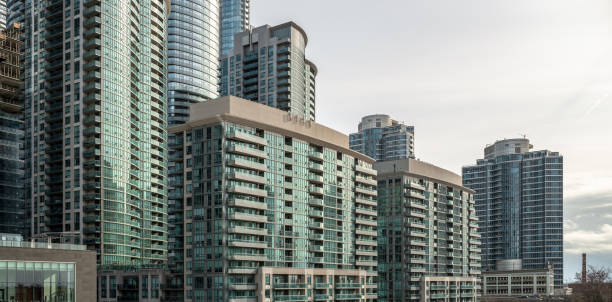1. Introduction
Toronto is one of Canada’s fastest-growing and most diverse cities, attracting residents from all over the world. Known for its skyline of glittering towers, vibrant neighborhoods, and strong job market, Toronto offers an impressive selection of condominiums for every budget and lifestyle. Whether you’re a first-time buyer, an investor, or upgrading your current home, knowing exactly how to buy a condo in Toronto can save you time, money, and stress.
Thank you for reading this post, don't forget to subscribe!This comprehensive guide will walk you through every step — from financial preparation to closing the deal — so you can navigate the city’s competitive real estate market with confidence.
2. Why Buy a Condo in Toronto?
Before diving into the process, it’s worth understanding why condos have become the property of choice for so many.
Location, Location, Location
Condos often occupy prime spots in Toronto — close to the downtown core, public transportation, schools, entertainment, and job hubs.
Lower Maintenance
With maintenance fees covering landscaping, security, and common area upkeep, condos let you enjoy urban living without the headaches of detached home maintenance.
Investment Potential
Toronto’s real estate market has historically appreciated over time, making condos attractive for both rental income and long-term capital gains.
Lifestyle Amenities
Most modern condos offer gyms, pools, rooftop patios, concierge services, and entertainment lounges — making them ideal for those seeking convenience.
3. Understanding Toronto’s Condo Market
How to buy a condo in Toronto market is dynamic and competitive. Knowing current trends helps you make smarter decisions when planning to buy a condo in Toronto.
Price Trends
Prices fluctuate by neighborhood, building age, and amenities. As of 2025, the average condo price in Toronto hovers around CAD 750,000, with prime downtown units fetching significantly more.
New Builds vs. Resale Condos
- New Builds: Modern designs, warranties, and brand-new amenities, but you may wait years for construction to complete.
- Resale Condos: Move-in ready, established communities, but potentially higher maintenance fees.
Popular Neighborhoods
- Downtown Core (Financial District, Entertainment District)
- Liberty Village – Popular with young professionals.
- Yorkville – Luxury living.
- Distillery District – Historic charm meets modern design.
- Scarborough & North York – More affordable options with transit access.
4. Key Considerations Before You Buy a Condo in Toronto
When searching for the right condo, think beyond price. Here’s a breakdown of crucial factors to evaluate:
Location & Accessibility
Proximity to work, transit lines, shopping centers, and schools should be a top priority.
Budget & Mortgage Pre-Approval
Get a mortgage pre-approval before shopping. It sets a realistic budget and strengthens your offer.
Building Amenities & Fees
Check if the building offers features you’ll actually use — and understand what your monthly condo fees cover.
Future Resale Value
Choose a unit that will appeal to future buyers — good layout, view, and neighborhood growth potential.
Age of the Building
Older buildings may offer larger units but can have higher maintenance fees.
Reserve Fund & Financial Health
Review the building’s financial statements to ensure there’s enough in the reserve fund for future repairs.
Rules & Restrictions
Some condos limit pets, short-term rentals, or renovations.
Parking & Storage
A parking spot and locker can significantly add to the value and convenience.
5. Step-by-Step Guide to Buying a Condo in Toronto
Step 1 – Determine Your Budget
Factor in the purchase price, closing costs, taxes, and moving expenses.
Step 2 – Get Pre-Approved for a Mortgage
Pre-approval not only sets your limit but also signals to sellers that you’re a serious buyer.
Step 3 – Choose the Right Real Estate Agent
Find an agent experienced in Toronto condos who can provide market insights and access to exclusive listings.
Step 4 – Start Your Search
Use a mix of online listings, open houses, and realtor connections. You can also explore reputable listings like:
- Pointe-Claire Luxury Apartments
- Luxurious Montreal Apartments for Rent
- Bright Chilliwack Rental Basement Suite
- Modern Apartments Coquitlam Braemar
- Vancouver Premium City Living
Step 5 – Make an Offer
Your realtor will help you prepare an offer based on comparable sales and market conditions.
Step 6 – Conduct a Status Certificate Review
This legal document outlines the condo’s financial and legal health — your lawyer must review it before finalizing the purchase.
Step 7 – Close the Deal
Sign the paperwork, transfer the funds, and get your keys.
6. Financial Aspects of Buying a Condo in Toronto
Down Payment
- Minimum 5% for properties under CAD 500,000.
- 10% on the portion between CAD 500,000 and CAD 1 million.
- 20% for properties over CAD 1 million.
Mortgage Insurance
Required if your down payment is under 20%.
Closing Costs
Include:
- Land Transfer Tax (plus Toronto’s municipal tax)
- Legal fees
- Title insurance
- Moving expenses
7. Legal Considerations
Status Certificate
Confirms the condo corporation’s financial stability, pending legal matters, and rules.
Condo Bylaws
Ensure you’re comfortable with rules on pets, renovations, and rentals.
Pre-Construction Contracts
These often favor the developer — get legal advice before signing.
8. Tips for First-Time Buyers
Work with a mortgage broker to compare rates.
Don’t stretch your budget — leave room for unexpected costs.
Visit the neighborhood at different times of day.
Understand condo fees and what they include.
9. Pros & Cons of Condo Ownership
Pros
- Lower maintenance responsibilities.
- Urban location.
- Amenities.
- Security.
Cons
- Monthly condo fees.
- Less privacy than detached homes.
- Restrictions on modifications.
10. Common Mistakes to Avoid When You Buy a Condo in Toronto
- Ignoring the status certificate.
- Overlooking high maintenance fees.
- Not factoring in resale value.
- Rushing without mortgage pre-approval.
11. Market Outlook for Toronto Condos
Toronto’s condo market remains strong due to limited land supply, steady immigration, and a vibrant job market. While prices can fluctuate in the short term, the long-term trend points to continued demand.
12. FAQs
Q1: How much deposit do you need to buy a condo in Toronto?
A: At least 5% for properties under CAD 500k, 10% for CAD 500k–1M, and 20% over CAD 1M.
Q2: Can foreigners buy a condo in Toronto?
A: Yes, though there may be additional taxes such as the Non-Resident Speculation Tax.
Q3: Are pre-construction condos a good investment?
A: They can be, but require patience and carry risks like construction delays.
Q4: How do condo fees work?
A: Fees cover shared expenses — the more amenities, the higher the fees.
13. Conclusion
Buying a condo in Toronto is a major investment, but with the right planning, research, and professional help, you can find a property that fits your lifestyle and budget. Whether you’re drawn to the energy of downtown, the charm of historic districts, or the convenience of transit-linked suburbs, the city offers something for everyone.







